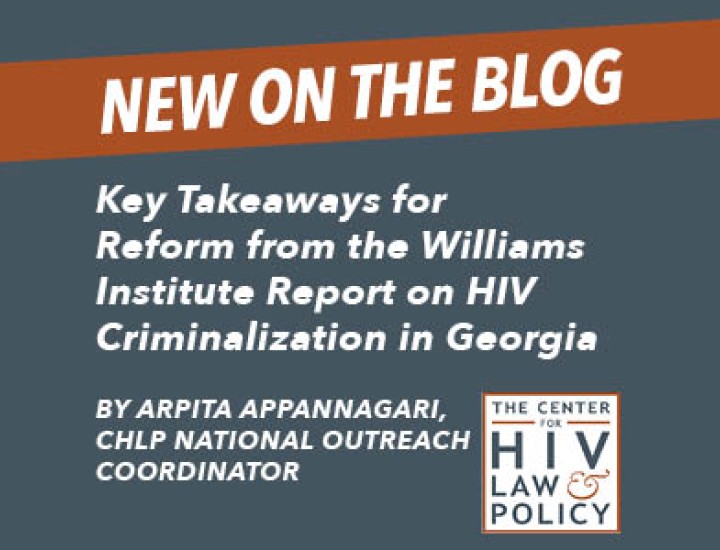Published January, 2018
HIV Criminalization in Georgia: Penal Implications for People Living with HIV/AIDS, Amira Hasenbush, The Williams Institute, UCLA School of Law (2018)
There are numerous striking findings in the Williams Institute report on HIV criminalization in Georgia. White women, who make up 3% of PLHIV in Georgia, represented 11% of HIV-related arrests. Yet—perhaps because of disparate HIV rates among black people in Georgia—black men and women were more likely to be arrested for HIV-related offenses than their white counterparts: 26% of HIV-related arrests were shite men, 46% were black men, 11% were white women, and 16% were black women. Once charged, black men were nearly twice as likely to be convicted of the HIV-related offense (16%) as white men (9%). However, when charged with concurrent offenses (44% of total arrests), white men were more likely (24%) than black men (15%) to be convicted of the non-HIV related offenses and not the HIV-related offense.
In an echo of the institute’s 2015 report on HIV Criminalization in California, sex workers in Georgia also face disproportionate impact; HIV-related incidents that did not involve sex work were more than twice as likely to result in no conviction, compared to incidents that also involved sex work offenses. And sex work offenses were more likely to involve women, particularly black women.
The report was based on arrests and convictions under Georgia’s one HIV-related criminal exposure statute, which contains seven separate offenses (for more on the HIV criminal laws in Georgia, see the Georgia excerpt from CHLP’s Sourcebook on HIV Criminalization in the U.S.). 571 HIV-related arrests occurred in Georgia from 1988 to September 2017, most of which were after 1997, and all of which occurred in 79 of Georgia’s 159 counties. PLHIV outside of Atlanta were three times as likely to be arrested for an HIV-related offense compared to those living in Atlanta.
Copyright Information: CHLP encourages the broad use and sharing of resources. Please credit CHLP when using these materials or their content. and do not alter, adapt or present as your work without prior permission from CHLP.
Legal Disclaimer: CHLP makes an effort to ensure legal information is correct and current, but the law is regularly changing, and the accuracy of the information provided cannot be guaranteed. The legal information in a given resource may not be applicable to all situations and is not—and should not be relied upon—as a substitute for legal advice.
